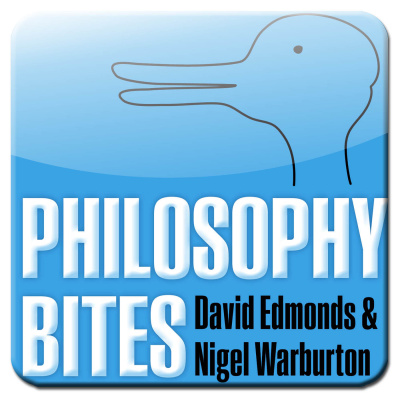Sinopse
top philosophers interviewed on bite-sized topics
Episódios
-
Jonathan Wolff on John Rawls' A Theory of Justice
28/02/2010John Rawls' A Theory of Justice is probably the most important work of political philosophy of the 20th Century. In this Philosophy Bites podcast Jonathan Wolff outlines the key features of that book and explores some of its limitations.
-
Jerrold Levinson on Music and Eros
15/02/2010Jerrold Levinson examines analogies between music an eros in this episode of the Philosophy Bites podcast.
-
Robert B. Talisse on Pragmatism
07/02/2010In this episode of the Philosophy Bites podcast Robert B. Talisse in discussion with Nigel Warburton explains what the philosphical movement of Pragmatism was, and some of the differences between the ideas of its founders Pierce, Dewey and James.
-
Thomas Pogge on Global Justice and Health
23/01/2010In this interview for the Philosophy Bites podcast Thomas Pogge, Professor of Philosophy at Yale University, explores the difficult issue of how we can achieve greater justice in the distribution of pharmaceutical products to countries which can't afford to pay the high prices sometimes demanded by manufacturers.
-
Tzvetan Todorov on the Englightenment Today
10/01/2010Tzvetan Todorov defends Englightenment values as important for us today in this episode of the philosophy podcast Philosophy Bites.
-
Don Cupitt on Jesus as Philosopher
24/12/2009Don Cupitt, controversial theologian and philosopher, argues that Jesus is best seen as a moralist and a radical secular humanist in this episode of the Philosophy Bites podcast. The podcast is introduced by David Edmonds. Nigel Warburton is the interviewer.
-
A.C. Grayling on Bertrand Russell on Descriptions
20/12/2009How our words relate to objects is a thorny philosophical conundrum. In this episode of the philosophy podcast Philosophy Bites A.C. Grayling explains Bertrand Russell's Theory of Descriptions, an attempt to elucidate that relationship.
-
Catalin Avramescu on the Idea of Cannibalism
06/12/2009 Duração: 12minCatalin Avramescu discusses the fascinating topic of the part played by the idea of cannibalism in the history of philosophy in this episode of the Philosophy Bites podcast.
-
Jeff McMahan on Killing in War
21/11/2009 Duração: 18minJeff McMahan of Rutgers University discusses the morality of killing in war with Nigel Warburton in this episode of the Philosophy Bites podcast.
-
Richard Bradley on Understanding Decisions
08/11/2009 Duração: 13minWhat is involved in understanding a decision? Richard Bradley of the LSE addresses this question in this episode of the Philosophy Bites podcast. As a decision theorist, he views decisions as gambles involving weightings of beliefs and desires.
-
Tony Coady on Dirty Hands in Politics
25/10/2009 Duração: 16minThis episode of the Philosophy Bites podcast focuses on the question of whether politicians need ever act immorally. Tony Coady (aka C.A.J. Coady), author of Messy Morality is in conversation with Nigel Warburton.
-
John Campbell on Berkeley's Puzzle
11/10/2009 Duração: 14minJohn Campbell explores Bishop Berkeley's puzzle about what our experience is of in this episode of the Philosophy Bites podcast.
-
Brian Leiter on Nietzsche Myths
25/09/2009 Duração: 16minFriedrich Nietzsche has been seen as the philosopher of the Overman, an anti-semite, and a precursor of postmodernist views about truth. But was he any of these? Brian Leiter explores these questions in conversation with Nigel Warburton in this episode of the Philosophy Bites podcast.
-
John Armstrong on What You Can Do With Philosophy
13/09/2009 Duração: 12minWhat can you do with Philosophy? Not very much, according to some people. John Armstrong disagrees. Find out why in this episode of the Philosophy Bites podcast
-
Walter Sinnott-Armstrong on Morality Without God
28/08/2009 Duração: 13minWalter Sinnott-Armstrong argues that God isn't necessary for morality in this episode of the Philosophy Bites podcast.
-
Sabine Doring on Emotion
14/08/2009What is an emotion? How do emotions differ from moods? What part should the emotions play in our lives and in our understanding of what it is to be human? Sabine Döring addresses these questions in this episode of the Philosophy Bites podcast.
-
Ben Rogers on Pascal's Pensées
29/07/2009 Duração: 16minBlaise Pascal's Pensées is the subject of this episode of the Philosophy Bites podcast. Few philosophers know the Pensées well, apart from the passage in which Pascal set forth his famous 'wager' - the idea that agnostics should gamble on God existing. Here Ben Rogers explains who Pascal was, and why his book is worth reading.
-
Marilyn McCord Adams on Evil
12/07/2009 Duração: 14minThe Problem of Evil is usually presented as a problem for believers. In this episode of the Philosophy Bites podcast Marilyn McCord Adams suggests that it is a problem for optimistic non-believers.
-
Luciano Floridi on the Fourth Revolution
28/06/2009 Duração: 13minNew technology is changing our relationship to reality and in the process what we are, argues Luciano Floridi, in this episode of the philosophy podcast Philosophy Bites. This is the fourth revolution.
-
Paul Snowdon on Persons and Animals
14/06/2009 Duração: 20minWhat is a person and what makes me the same person over time despite change? John Locke emphasized that continuity of memory makes us the same person over time. In contrast Paul Snowdon argues that we should see persons as animals.



